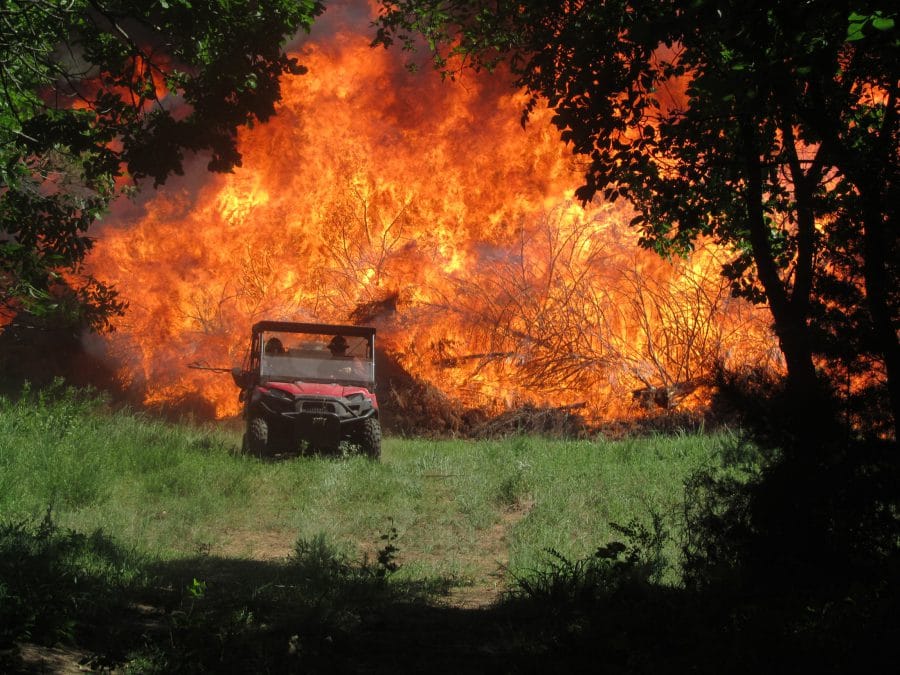Since 2015, the Citizen Potawatomi Nation has employed efforts to eradicate Eastern Redcedar and Scotch thistle across Tribal lands. Red cedars pose threats to grasslands and plains by altering ecosystems, harming native flora and fauna, decreasing water availability and increasing potential for catastrophic wildfires. CPN recently received a Bureau of Indian Affairs Invasive Species grant for $236,068 to continue its efforts to safeguard Tribal land against plants that threaten Citizen Potawatomi cultural and economic success.
CPN member and Department of Real Estate Services Property Manager David Bourbonnais oversees the Nation’s work to exterminate harmful plant infestations.
“If you ever look at cedars, there’s nothing that grows around or under it. It’s just bare ground. If you remove those cedars, you let the native grasses come back … it’s just better for the ground and countryside itself,” he said.
As invasive species, Scotch thistle and red cedar have little to no competition, and they cause physical damage to the earth.

Eradication efforts
After receiving its first grant in 2015, CPN conducted a survey to determine the extent and severity of cedar infestation across Tribal-owned land and developed categories to prioritize extermination. The assessment estimated 4,000 acres of CPN property met the standards for level II or level III infestation. These two categories indicate areas with dense populations and cedars with large diameters that require heavy equipment and professional collaboration.
In 2016, the Nation began efforts to remove the hardy evergreens on Tribal-owned land across thousands of acres.
“We felt like we made a lot of progress that first year,” Bourbonnais said. “We cleared about 1,000 acres, and that was very helpful for us to get another round of funding because the BIA was pleased with the progress we had made.”
To exterminate red cedars, CPN equipment operators and employees cut down the trees and placed them into piles to burn at a later date. Conducting a prescribed burn requires adequate humidity and low wind, and the Nation works closely with area fire departments and municipalities to ensure safety.
“If you pick the perfect weather conditions, the smoke will just go up and then disperse, and there’s not any problem,” Bourbonnais said.
Red cedars output extreme heat when combusted, which makes firefighting more difficult.
“It’s so hot you have to stay a quarter of a mile away during the prescribed burns,” he explained.
Prescribed burning deters the chances of an uncontrolled fire from occurring in the future and working with area fire stations and internal CPN experts mitigates risks.
Although most of the cedars across Tribal land are too small for other uses, the department does work to keep back those of the highest quality for use in ceremony and feather box making, and Potawatomi Gifts inside the Cultural Heritage Center sells CPN cedar for members to create their own pieces.
“It’s not economically feasible and is very labor intensive to use everything we cut, but we do keep back and process some ourselves,” Bourbonnais said.
Sustainability
Since 2016, CPN has decreased cedar populations across Tribal land, removing the conifers across thousands of acres. The 2020 grant provides funding to rehabilitate and prevent the future return of invasive species in-house, cutting down on outside contracting.
“In the last five years, we have gone from nothing to where we are almost self-sufficient,” Bourbonnais said.
According to the grant application, “The Nation believes that use of internal resources is the most cost-effective way to control this harmful invasive species.”
Developing Tribal infrastructure to exterminate red cedar, thistles and other unwanted plants also provides increased financial opportunity. Proposed land restoration significantly increases economic profits through hay production and increased land lease fees. The return on investment defrays future project costs and increases long-term sustainability.
For more information on the CPN Department of Real Estate Services, visit cpn.news/dres. And to purchase cedar harvested on CPN land, visit potawatomigifts.com.
